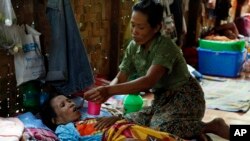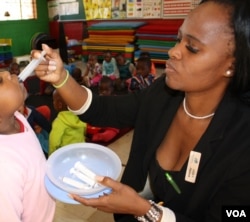Researchers in the United States are calling it a "Big Deal." Next year, human tests could lead to a new treatment for AIDS. It is being called an innovative and creative treatment. The treatment changes the DNA of cells to make them HIV fighters. It has protected monkeys from a primate type of the immune disorder.
VOA's Jessica Berman reported this story from Washington, D.C. for VOA News.
Researchers in the United States are changing healthy muscle cells to make them produce genetic information that could possibly neutralize HIV, the virus that causes AIDS in humans. Scientists at Scripps Research Institute in Jupiter, Florida, tested the treatment on a type of monkey.
The immune systems of these monkeys were repeatedly exposed to simian immunodeficiency virus (SIV), the primate version of HIV. The animals never became infected after a treatment to change the muscle cells.
Michael Farzan is the lead researcher on the project. He and his team administered the virus to the monkeys in increasing amounts. They started with a dose that easily passes SIV to the untreated monkeys in the control group. But the treated monkey remained uninfected. Then, the scientists doubled the dose for each re-exposure to the virus.
Mr. Farzan said even monkeys that received 16 times the usual dose were protected. They did not get infected with SIV.
"We continued to administer the virus, doubling the dose each time. We've now gone to -- with six doses that were capable of infecting control ((untreated)) animals -- we've gone to 16 times that."
Making HIV kill itself
Traditional vaccines train the immune system to recognize and destroy disease. But experimental AIDS vaccines fail at this because the virus is always mutating, or changing, to avoid destruction. HIV and SIV are both able to do this because of a surface protein that mutates to avoid the body’s immune system.
Mr. Farzan says this new drug treatment is based on tricking HIV. The drug tricks HIV into exposing this important viral surface protein.
The experimental compound attaches to the part of the virus that is always mutating to avoid the immune system. Once attached, a second protein makes the virus self-destruct. The virus never has a chance to infect cells.
"Because HIV is sort of fooled into thinking that it's binding the cell, it undergoes the changes that it would normally do when it's ready to enter a cell. And those changes, um, if it's not near a cell, inactivate the virus."
The muscle cells continually produce cells that fool the virus into self-destruction.
Mr. Farzan says the compound has the potential both to protect against infection with HIV and to fight the virus in infected people. The team wants to begin testing human patients who are not able to take antiretroviral drugs.
The researchers published their findings in the journal Nature.
According the World Health Organization, almost 78 million people have been infected with the HIV virus. About 39 million people have died of HIV.
In 2013 alone, 35 million people were living with HIV or AIDS and 1.5 million died from AIDS.
The virus still affects Sub-Saharan Africa more severely than any other part of the world. Nearly one in every 20 adults there is living with HIV. This represents almost 71% of the people living with HIV worldwide.
I’m Anna Matteo.
Jessica Berman reported this story for VOA News from Washington, DC. Anna Matteo wrote it for Learning English. Caty Weaver was the editor.
_____________________________________________________________
Words in This Story
genetic – adj. of, relating to, or involving genes
neutralize – v. to stop (someone or something) from being effective or harmful
immune system – n. the system that protects your body from diseases and infections
primate – n. any member of the group of animals that includes human beings, apes, and monkeys
dose – n. the amount of a medicine, drug, or vitamin that is taken at one time
expose – v. subject to risk from a harmful action or condition
mutate – v. biology to cause a gene to change and create an unusual characteristic in a plant or animal
antiretroviral – adj. acting, used, or effective against retroviruses <antiretroviral drugs> <antiretroviral therapy>






